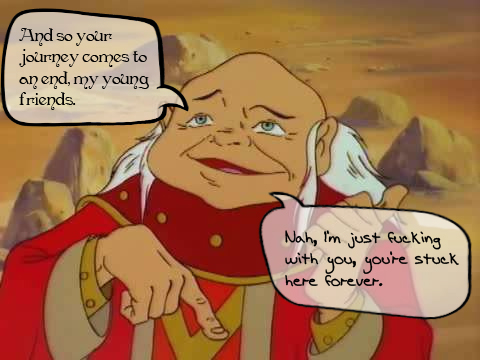Planning for the End
Tabletop roleplaying games implode, or explode, or some type of plode, on a regular basis. Even getting past character creation is often a feat of monumental will and luck. People are busy, and scheduling a time when five or six people can assemble for a few hours in nearly impossible, particularly once you’re out of college. Also, for whatever reason, people that are drawn to roleplaying as a hobby tend to be relatively high strung, so often drama ensues. I’ve had games end because of new jobs, divorces, physical fights at the table, and any number of other factors. However, last Thursday, I finally had a game I was running end where it was supposed to: at the end of the story.
The game lasted for two and a half years and spanned from level 1 to level 10 of sweet dusty Dark Sun goodness. I used the 4th Edition ruleset, tossed on a few house rules, and then reskinned a bunch of modules to fit my story. The game generated far too many in-jokes and ridiculous memes to relate, and it just a solid two and a half years of great memories with a great group of people. The final moments of the game as I related the character’s fate were dead silent in the room, with my players staring at me, rapt on my every word. Then it ended with a moment of silence. Since Thursday I’ve felt a bit at loose ends, as if something significant in my life has gone away (even though we’re still getting together for other games). The feeling is like finishing an amazing book – you’re happy you finished it, but it feels like an important part of you is gone. So, I thought I’d write some of my thoughts on how to make a game last and be successful.
1. Choose committed players than have some time management skills and not a lot of drama.
If someone is late everywhere they go, never takes their commitments seriously, and constantly commits to multiple events on the same day, they’re probably not going to work out long term in your game. Scheduling is the single largest conflict involved in a successful game, and in order to go for the long haul, you need people that are respectful of each other’s time.
You also need people that don’t cause an undue amount of melodrama in their lives and the lives of the people around them. If someone is constantly involved in some kind of conflict with someone, or is always talking about how X person wronged them in some fashion, they’re probably not a good choice either. Roleplaying is often a highly emotional and vulnerable space for people to exist in. People that run hot on drama all the time, even though they might be good people, are probably going to blow up somehow and tank the game. The roleplay in any good tabletop is give and take, and these people often don’t do one of those two things well.
2. Pregenerate your encounters
I hate the bookkeeping portion of running a game. The story and concept work is a breeze for me, but I just get bored when I sit down in front of a budget sheet to try and play balance the fights for the next session. My solution for this was to take some of the module that Wizards of the Coast published and reskin them to fit my plot. That way I had the encounters, but could do whatever I wanted with the context. This let me spend the maximum amount of time tailoring the story from week to week to fit what the characters had done. The world became much more responsive to them, and they felt like they had a greater hand in shaping the story.
Even if you enjoy the encounter design portion of GMing, that is a very independant part of the GM experience. It can be done without a lot of player involvement, with only minor tweaks needed based on player action. Giving yourself that extra time each week to not worry about numbers and instead think about story really helps you flesh out your ideas and make them come alive.
3. Make the game about the characters
Think about the plot of your game. Could the characters be pulled out and replaced with other characters? Do their actions really matter in the long run? I vastly prefer to make the plots of my games about the characters themselves. The driving quest should come from THEM, not be given to them by some old man in a cave. That immediately makes the players motivated to come to the table each week, because plot progress is THEIR progress. For example, the game I just ended was a revenge story. The first session I ran featured the characters as children living in an idyllic village. I gave them time to really get into the setting and their characters as children, and allowed them to form connections with their community and each other. Then I had bandits raid and destroy their town. Fast forward ten years to when the characters are level 1 and reuniting with their first opportunity to pursue revenge against those who had wronged them.
I didn’t need to move the plot along in any session, because the players moved it for me. They decided where the plot should go from week to week, and all I needed to do was respond. That only worked because I gave them powerful motivation to begin with – meeting in a bar doesn’t exactly provide the same sort of pathos.
4. Have definite arcs and an end goal
Right up front split your story into several small sections, and have an end in mind for the game. That way you know what you need to do to corral the players when the run totally off the rails, and you don’t need to just say “Guys, you need to follow the plot.” If you have smaller waypoints of plot progression, you can judge how you need to adjust things as you go, and give the players feelings of real accomplishment along the long road toward the ending.
Epic stories often fail because they don’t reward players enough along the way. If you structure the story such that there are three or five sub-objectives that fit into the main plot, the players get a sense of reward, and you have time to rebalance the story. You need to be careful to avoid any obvious Metroidvania style obstacles that obviously exist solely to stretch out the story, however. Players can smell busy work bullshit from a mile away.
5. Tell the story AND run the system with the players, not at them
One of the hardest lessons to learn as a GM is that you are not the boss – you are the leader. There is a very great distinction between the two, but in figuring it out, you’ll run better games every single time.
A boss is the font of everything in the game. Authority starts and ends with the GM and what he or she says, goes. All story comes from the GM, all house rules, all arbitration, and basically everything. Some GMs even control the actions of the characters in their game, or tell players that their characters wouldn’t ever do thing X. This style of GMing takes the life out of the players entirely, and ends up making their characters props in a story the GM is essentially telling for his or her self.
A leader style GM does not create of control everything, they simply shepherd it along. If a player has a good idea about the rules, the GM grabs the idea and implements it. If a player wants to tell a certain story, the GM works with the player make that story happen. If conflicts arise, the GM serves whatever role is necessary to put an end to them. You basically are the main plot generator and project manager of the game, not the boss. A good tabletop is a team effort, not a one man show.
6. Give yourself breaks
It’s important to maintain momentum in a game, but not at the expense of burning out and not finishing the game at all. Every few months take a week or two off and let everyone have a night back to just sit around and brain drain. This often happens naturally during the course of a game as people have life shit come up from time to time. My rule is that if my game has 5 players, I won’t run if 1 is missing, and if it has 6 players, up to 2 can be missing. It’s important to regard missed sessions AS breaks, however, and not get frustrated when people can’t make it. Life happens, go ride a bike.
And those are my basic guidelines to running a long term successful tabletop. If you can pull it off, it’s extremely rewarding to both you and your players. And if you don’t, well, at least you gave it a shot and had some fun in the meantime. But if you’ve failed in the past, even a lot, remember – at least one guy out there managed to pull it off, so it MUST be possible.





